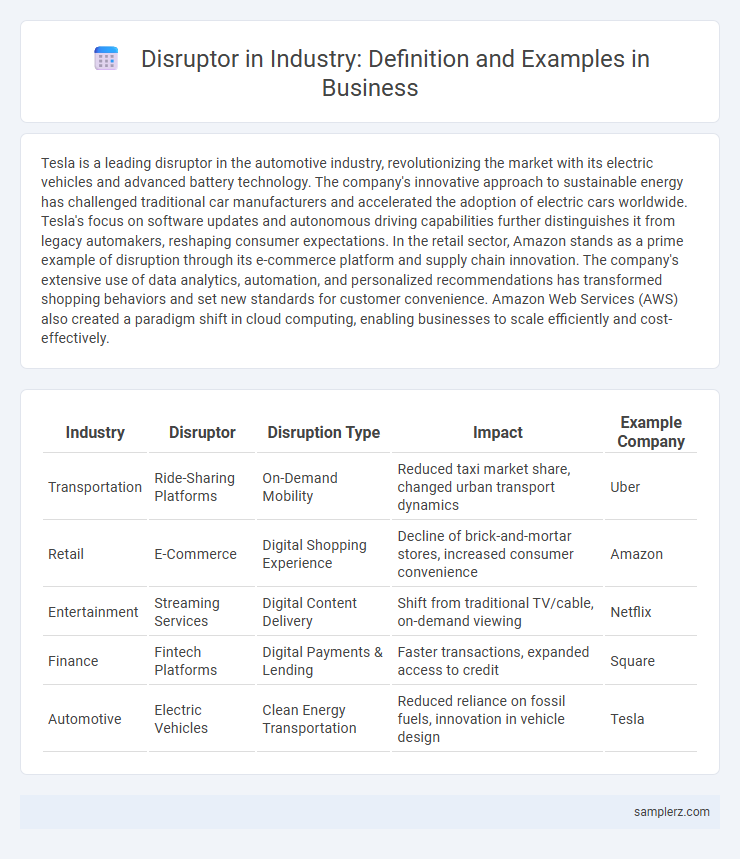Tesla is a leading disruptor in the automotive industry, revolutionizing the market with its electric vehicles and advanced battery technology. The company's innovative approach to sustainable energy has challenged traditional car manufacturers and accelerated the adoption of electric cars worldwide. Tesla's focus on software updates and autonomous driving capabilities further distinguishes it from legacy automakers, reshaping consumer expectations. In the retail sector, Amazon stands as a prime example of disruption through its e-commerce platform and supply chain innovation. The company's extensive use of data analytics, automation, and personalized recommendations has transformed shopping behaviors and set new standards for customer convenience. Amazon Web Services (AWS) also created a paradigm shift in cloud computing, enabling businesses to scale efficiently and cost-effectively.
Table of Comparison
| Industry | Disruptor | Disruption Type | Impact | Example Company |
|---|---|---|---|---|
| Transportation | Ride-Sharing Platforms | On-Demand Mobility | Reduced taxi market share, changed urban transport dynamics | Uber |
| Retail | E-Commerce | Digital Shopping Experience | Decline of brick-and-mortar stores, increased consumer convenience | Amazon |
| Entertainment | Streaming Services | Digital Content Delivery | Shift from traditional TV/cable, on-demand viewing | Netflix |
| Finance | Fintech Platforms | Digital Payments & Lending | Faster transactions, expanded access to credit | Square |
| Automotive | Electric Vehicles | Clean Energy Transportation | Reduced reliance on fossil fuels, innovation in vehicle design | Tesla |
Defining Industry Disruptors: Key Characteristics
Industry disruptors are companies that introduce innovative products, services, or business models, fundamentally changing market landscapes and consumer behavior. Key characteristics include rapid scalability, technology-driven solutions, and the ability to challenge established incumbents by offering enhanced value propositions or cost advantages. Notable examples include Uber's transformation of transportation and Airbnb's redefinition of hospitality through platform-based sharing economies.
Historical Examples of Market Disruption
Kodak's failure to adapt to digital photography revolutionized the imaging industry by allowing competitors like Canon and Sony to dominate. Blockbuster's decline amid the rise of Netflix demonstrated how streaming technology reshaped media consumption and distribution. Amazon's transformation of retail through e-commerce and logistics innovations set new standards for customer convenience and market reach.
Uber: Revolutionizing Urban Transportation
Uber transformed urban transportation by introducing a ride-sharing platform that leverages smartphone technology to connect drivers with passengers efficiently. The company's innovative use of real-time GPS tracking and dynamic pricing disrupted traditional taxi services, reducing wait times and increasing convenience. By creating a scalable, asset-light model, Uber redefined mobility, setting new standards for customer experience and operational efficiency in the transportation industry.
Netflix: Transforming Entertainment Consumption
Netflix revolutionized the entertainment industry by pioneering streaming services that replaced traditional physical media and cable subscriptions. Its data-driven content recommendations and original programming disrupted conventional distribution models, shifting consumer behavior toward on-demand viewing. This transformation forced competitors to innovate, reshaping the global entertainment landscape.
Airbnb’s Impact on the Hospitality Sector
Airbnb revolutionized the hospitality sector by leveraging a digital platform that connects property owners with travelers seeking short-term rentals, significantly expanding lodging options beyond traditional hotels. This disruption forced established hotel chains to innovate pricing models, enhance guest experiences, and adopt flexible booking policies to remain competitive. Airbnb's peer-to-peer model also stimulated local economies by increasing tourism in non-central urban areas and offering diverse accommodation experiences worldwide.
Amazon’s Evolution and Retail Disruption
Amazon transformed the retail industry by pioneering e-commerce, leveraging advanced logistics and customer-centric innovations such as Amazon Prime and personalized recommendations. Its use of big data analytics and cloud technology through AWS redefined supply chain efficiency and scalability. This disruption forced traditional brick-and-mortar retailers to adapt rapidly or face obsolescence in a market increasingly dominated by digital convenience and speed.
Fintech Startups Challenging Traditional Banking
Fintech startups like Revolut and Chime are revolutionizing the banking industry by offering seamless digital banking services with lower fees and enhanced user experiences. These disruptors leverage advanced technologies such as AI-driven credit scoring and blockchain to provide faster, more secure transactions and personalized financial products. Their innovative models are pressuring traditional banks to adopt agile digital strategies to retain customers and stay competitive.
Tesla’s Role in Automotive Industry Disruption
Tesla revolutionized the automotive industry by pioneering electric vehicle technology with high-performance battery systems and autonomous driving capabilities. Its direct-to-consumer sales model disrupted traditional dealership frameworks, accelerating the shift towards sustainable transportation. Tesla's innovation in software updates and energy integration positioned it as a leader in the future of mobility and clean energy solutions.
The Influence of Digital Payments on Commerce
Digital payment platforms like PayPal and Square have revolutionized commerce by enabling instant, secure transactions across global markets. These disruptors have significantly reduced reliance on cash and traditional banking, accelerating the shift toward e-commerce and mobile payments. Their influence drives increased convenience, enhanced consumer trust, and expanded financial inclusion for businesses and customers worldwide.
Lessons Learned from Notable Industry Disruptors
Amazon revolutionized retail by leveraging advanced logistics and customer-centric technology, setting new standards for e-commerce efficiency and personalization. Netflix transformed media consumption through streaming technology and original content, forcing traditional media companies to innovate rapidly or lose market share. Tesla accelerated the automotive industry's shift to electric vehicles by combining cutting-edge battery technology with software-driven innovation, illustrating the power of integrating sustainability with high performance.

example of disruptor in industry Infographic
 samplerz.com
samplerz.com